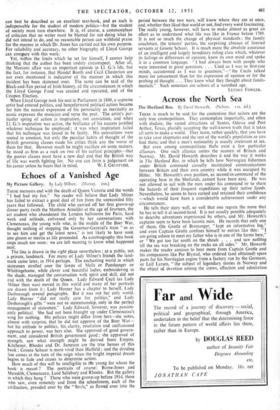Echoes of a Vanished Age
My Picture Gallery. By Lady Milner. (Murray. 2os.) THESE memoirs end with the death of Queen Victoria and the words " I had had my fun." No .reader will believe that Lady Milner has failed to extract a good deal of fun from the unrecorded fifty years. that followed. The child who carried off her first grown-up dinner party (with the Matthew Arnolds) at the age of fourteen, the art student who abandoned the London ballrooms for Paris, hard work and solitude, enlivened only by her conversations with Clemenceau, the young wife who, in the middle of the Boer War, thought nothing of stopping the Governor-General's train " so as to see him and get the latest news," is not likely to have sunk into gloom or inertia as life proceeded. As autobiography this book stops much too soon: we are left wanting to know what happened next.
The line is drawn in the right place nevertheless ' • at a public, not a private, landmark. For many of Lady Milner's friends the land- mark came later, in 1914 perhaps. The enchanting world in which statesmen strolled over the lawns of Mells or Panshanger or Whittingehame, while clever and beautiful ladies, embroidering in the shade, managed the conversation with spirit and skill, did not end with the death of the Queen. Lady Edward Cecil (as Lady Milner then was) moved in this world and many of her portraits are drawn from it ; Lady Horner has a chapter to herself, Lady Desborough several paragraphs. But it was not her only world. Lady Horner " did not really care for politics," and Lady Desborough's gifts " were not 'in statesmanship, only in the perfect management of statesmen." Lady Edward, however, was passion- ately political. She had not been brought up under Clemenceau's wing for nothing. His policies might differ from hers—she notes, almost with surprise, that he did not approve of the Boer War— but his attitude to politics, his, clarity, resolution and unillusioned approach to power, was hers also. She approved of good govern. ment, and considered British government good - she approved of strength, saw what strength might be derived from Empire. Kitchener, Rhodes and Dr. Jameson are the true heroes of this book ; Groote Schuur is more vivid than Hatfield - and the dividing line comes at the turn of the reign when the bright imperial dream begins to fade and ceases to determine action.
How much of this will be intelligible to tYre young for whom the book% is meant ? The portraits of course: Burne-Jones and Meredith, Clemenceau, Lord Salisbury and Rhodes. But the gallery in which they hang ? Those who were grown-up before 1914, those who saw, even remotely and from the schoolroom, such of the civilisation, presided over by the " Souls," as flowed over into the period between the two wars, will know where they are at once, and, whether they liked that world or not, find every word fascinating. The really young, however, will have to make almost as great an effort as to understand what life was like in France before 1789. It is not so much the change of physical standards ; the family coachman, the tenants' parties, the surprising absence of liveried servants at Groote Schuur. It is much more the absolute assurance of an intelligent and largely hereditary ruling class which, whatever its failings or differences of opinion, knew its own mind and spoke it in a common language. " I had always been with people who were interested in great questions. . . . Used as I was to first-rate minds, accustomed as I was to greatness,"—" the Cecils talked more for amusement than for the expression of opinion or for the probing of thought.... They knew what they thought about funda- mentals." Such sentences are echoes of a vanished age.
LETTICE FOWLER.


































 Previous page
Previous page